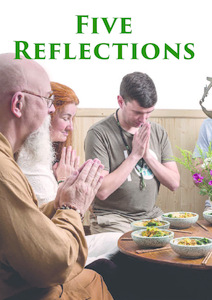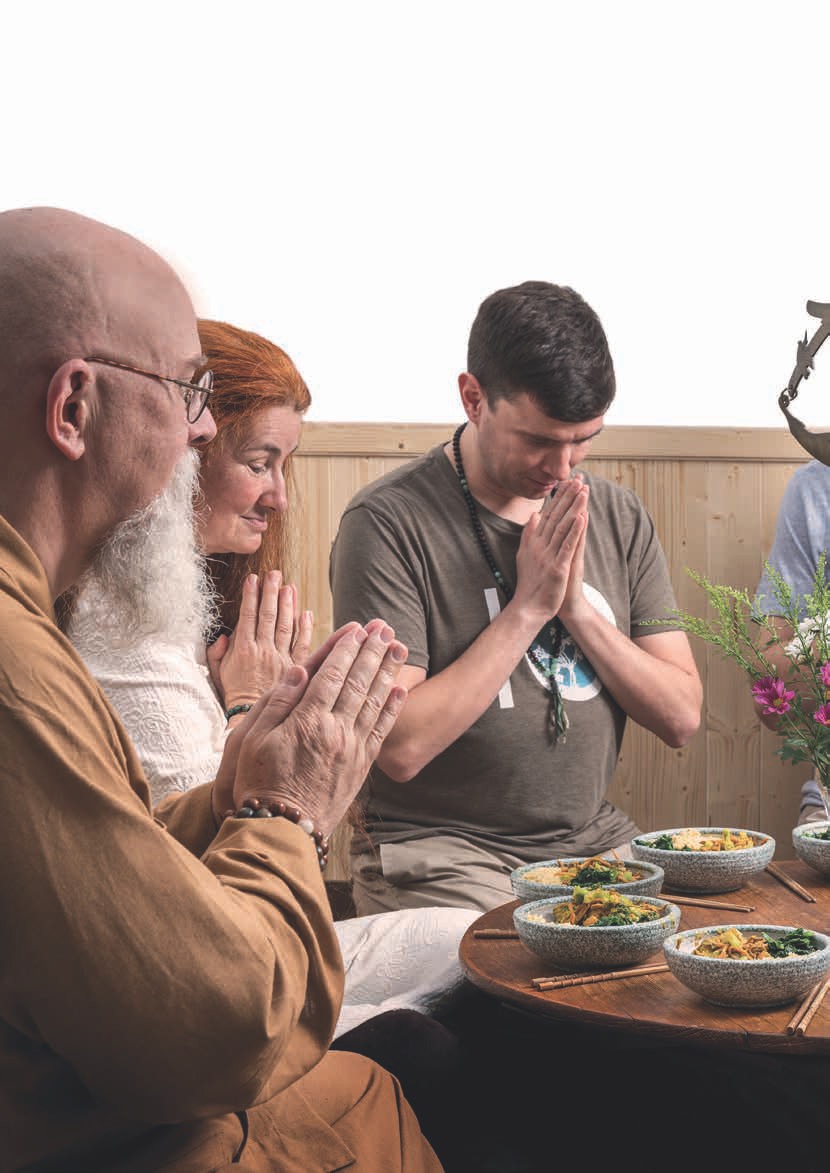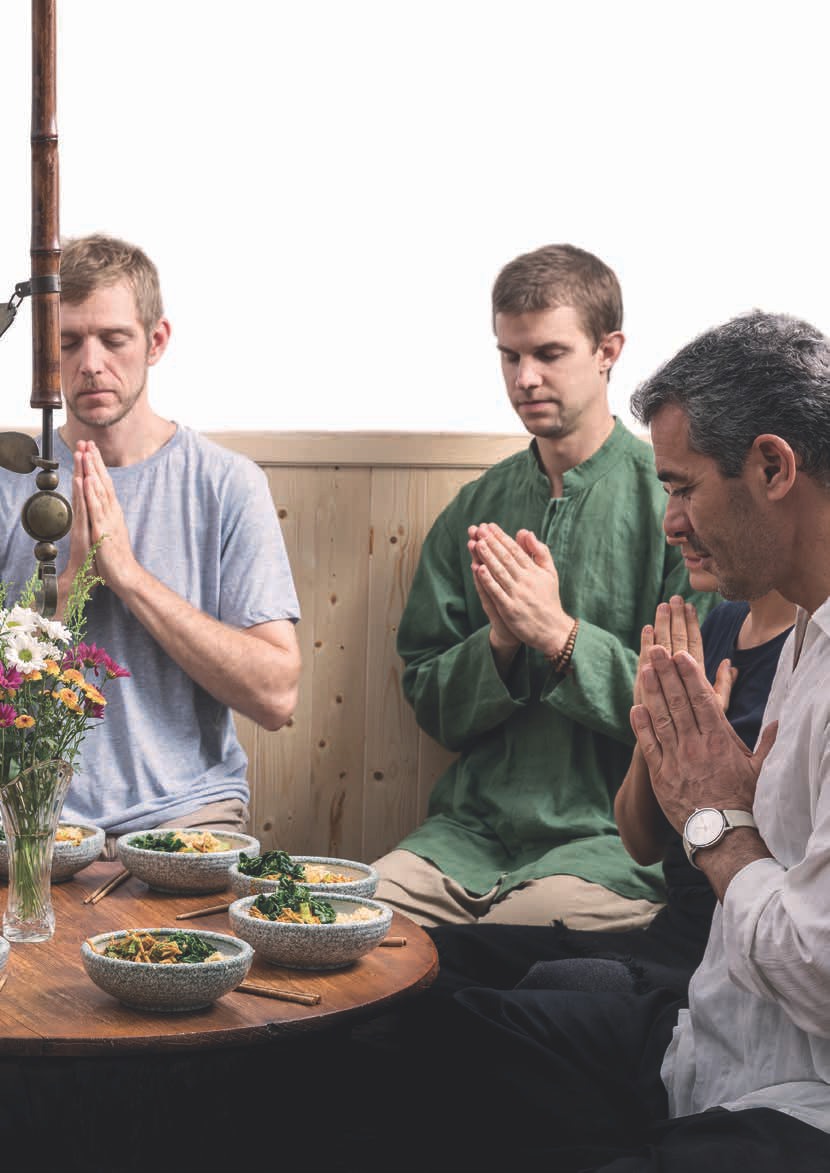
 |
|


More than anything, the first reflection is an expression of gratitude. I remember when I first woke up to the fact that our life requires death. (Not only of animals, but plants as well.) Why is my life more valuable? What am I really contributing to this world that justifies the sacrifice of life to continue my existence? How do I reconcile the fact that my life is made up of death? The food in front of us is not merely the sacrifice of the plants we are eating, but the whole evolutionary process from the beginning of the Universe (and possibly before it). The food we consume is not the death of this one life form, but the process of life and death up until now. And it continues beyond us as well. Here, we take pause in this infinite continuum stretching in both directions, looking at the food offered to us with open eyes, reflecting on the Sacrifice within this meal. This meal contains the Universe, and nothing is missing from the meal: It contains the stars, the moon, the sun, the weather, the Earth and the seas, animals, insects and people. It is all there, and it is all offered to us. Lots of effort went into this meal!
So we are offered the Universe... Why? Surely I am not worthy of this. Surely I will merely squander this away like so many other gifts given to me. This is where I trip myself up. Often, if Wu De cooks something really special, he will turn to me and say in a playfully serious way: "Gibb, you better reflect really hard on your virtue and worthiness to receive this meal." But here is the thing: this reflection is a statement, not a question. It does not ask if we are worthy or not, it says we reflect on our worthiness. It is there. This is merely an invitation, like all teachings, to reflect on our worthiness. We can also reflect on our virtue - the parts that shine bright already and the ones we need to polish more. Taking moral inventory isn't about guilt; it's positive. The mind that reflects on mistakes has already within it what is needed to transcend that misbehavior. Recognizing that I want to change my thoughts, speech or action means that I am already bigger than those patterns. We reflect on our misbehavior because we are virtuous, and that makes us worthy of this meal. That makes us good people.
As the oldest child growing up in a large family, I was in a position of power, relatively speaking. Like many before me, I used this power for my own gain. One of my privileges was serving the ice cream to my brothers and sister after a meal. In New Zealand, we have an ice cream called "Goody Goody Gumdrops," which is a sickening green color and filled with gumdrop candies (or "lollies" as we call them "Down Under"). Every time I found one of these sweet little treasures, I was sure to place it in my bowl. I can laugh about it now, but there is sadness in the fact that I cheated my siblings, and for what? A few measly balls of sugar. Greed constricts us and closes our world down. It makes it hard for us to see the big picture. Ultimately, greed blocks our compassion. How can we be free if we cannot let go of this primal attachment to food? By letting it go of our attachment, we realize that we receive something much greater. This reflection also reminds me to look deeper into all the reasons why we eat, many of which are not about sustenance. We also have emotional hungers, and they aren't always healthy.
The last part is less of a reflection and more of a knot that ties the other four together. The answer to the question of how best to honor this medicine made of sacrifice before us is to use this food in our journey of self-cultivation. This food helps us grow, so that we in turn can help others. Without this food, we would not be alive. It sustains us another day. Without it, we could not seek truth or follow our Dao, and we would have no opportunity to liberate ourselves from the suffering of experience. We should not view this food as mere "stuff." The way to move beyond the mindset of seeing food as fuel packets to get you through the day is to view the process of growing and preparing food, then consuming and becoming it in its totality. Seeing that this process is not about me or my individual needs, but part of the impersonal expansion of consciousness into infinity, helps me to cultivate wisdom. By accepting and eating this food with reverence towards the whole process that brought it to us, which is the process of the whole Universe itself, we realize that the only valid reason to consume it is "for the good of all beings." We honor what we take by giving back more. Giving back more is the secret to life.
This reflection is to me an invitation to see beyond food as sensory indulgence. Our bodies are systems. The basics of any system are that the inputs determine outputs. "What you put in is what you get out," so to speak. The type of food and the way we approach food is of the utmost importance to our general wellbeing. Chinese medicine also views food as a paramount medicine. Is food for our healing or is it for our pleasure? For those inclined towards the latter, I would encourage you to look again at the first reflection. This is not to say we cannot enjoy food, or it cannot taste great; it's to say that is not primary. The ideal is always "nutritious and delicious," as Wu De often says, but nutritious should come first. Once we see our food as medicine for others, our environment and ourselves then we can look at the other elements that we love about food. Then, you find the magic that when food is healthy and tastes nice, it actually tastes better, is guilt-free and you can savor it more deeply, knowing that it will result it a happier, healthier, longer and more energetic life.